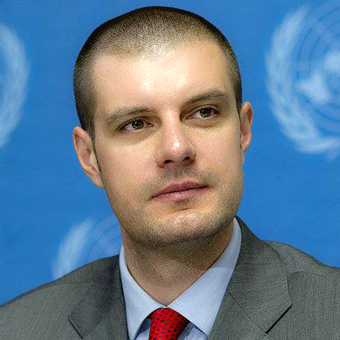
Miladin Bogetic: United Nations Officer
Miladin Bogetic, a public information officer at the United Nations Office at Geneva, attended the University of Maine from 2001–02 as part of UMaine’s international student exchange program while he was an undergraduate at the American University in Bulgaria (AUBG).
Bogetic was born in Sarajevo, Bosnia and Herzegovina and grew up in Podgorica, Montenegro, where his family still lives.
He earned a bachelor’s degree in political science and international relations from AUBG in 2003, a diploma in advanced international studies from Johns Hopkins University-SAIS in Bologna in 2004 and master’s degree in advanced international studies from Diplomatic Academy Vienna in 2005.
Why did you decide to come to UMaine?
After spending two years at the American University in Bulgaria (AUBG), I felt like changing the environment a little bit and trying something different. The University of Maine was an obvious choice — an established, well-respected school that had very strong bilateral ties with AUBG. There were a number of courses I wanted to take that were available at UMaine and not at AUBG. I also had heard great things about beautiful nature in Maine.
How did your UMaine experience compare to your time at other universities?
From the start, I felt very warmly welcomed by the entire UMaine community, from the Office of International Programs to my American classmates, staff and faculty across campus.
The small Bulgarian community at UMaine, primarily Aglika Georgieva and Orlina Boteva, took care of me and another exchange student and made us feel even more welcome. They picked us up on the day we arrived in Bangor and provided so much invaluable advice and assistance during the whole year.
The fact that UMaine is located in a small town — without big city distractions nearby — contributed to this sense of belonging and community. All other places where I studied (Blagoevgrad, Bologna, Vienna) were much larger and the student body was more dispersed.
Academically, there were some courses I truly enjoyed, such as professor James Warhola’s classes on Russian foreign policy and professor Michael Palmer’s political philosophy.
Describe your current job and responsibilities with the UN:
My job entails communicating to the press corps and the public on the activities of the UN and International Geneva. This is done through regular and ad hoc press briefings and conferences, coverage of human rights treaty bodies, running UN Geneva social media accounts, and conducting outreach activities with local schools, universities and NGOs [non-governmental organizations].
A major project I recently worked on was TEDxPlaceDesNations, which took place Dec. 11 and featured 11 extraordinary individuals making a difference in people’s lives with the help of International Geneva.
How long have you been in your current position?
I have been in Geneva since September 2013. Prior to that, I worked as a political affairs officer at the UN Interim Force in Lebanon (UNIFIL) for three years. Before, I was a diplomat in the Foreign Ministry of Montenegro.
Have you been back to Maine or campus since 2002?
My girlfriend and I visited Maine and campus in September 2005. We were warmly welcomed by Karen Boucias [the former director of UMaine’s Office of International Programs], who let us stay at her beautiful home for a couple of days. It was great to see some former classmates, favorite professors and staff, and have a meal at York Commons, where I used to work.
While at UMaine, did you work closely with a professor or mentor who made your experience better?
I particularly enjoyed classes with professor James Warhola; one on the history of the Soviet Union, and the other on Russia’s foreign policy. Coming from Eastern Europe, it was great to exchange thoughts and ideas with such a connoisseur of Slavic cultures and political systems. As I was preparing to graduate from the American University in Bulgaria, Warhola gave me valuable advice and support for graduate studies, for which I am still grateful.
The entire staff in the Office of International Programs was truly supportive and made me feel welcome throughout the academic year.
What was your favorite place on campus?
I liked the large central lawn [the Mall], which was great to hang out in early fall and late spring, with trees assuming colors they can only have in New England. I also quite enjoyed my residence hall — Estabrooke — and the state-of-the-art gym.
Most memorable UMaine moment?
Perhaps the excursion to the stunning Acadia National Park, organized by Mireille Le Gal of the Office of International Programs. That was when I saw a moose for the first time in my life. Oronoka parties were always fun, too.
What advice would you give students who are considering studying abroad?
Studying abroad would truly expand your horizons and open your mind. It is a great opportunity to experience a different culture, improve a foreign language and live in a new community for 8–10 months. Friendships and connections made during a year abroad often last a lifetime.
Twelve years later, I can say that I am glad to have been given an opportunity to spend a year at UMaine. It helped me learn a lot, grow and develop as a person, and experience beautiful New England, which is still my favorite part of the U.S.
